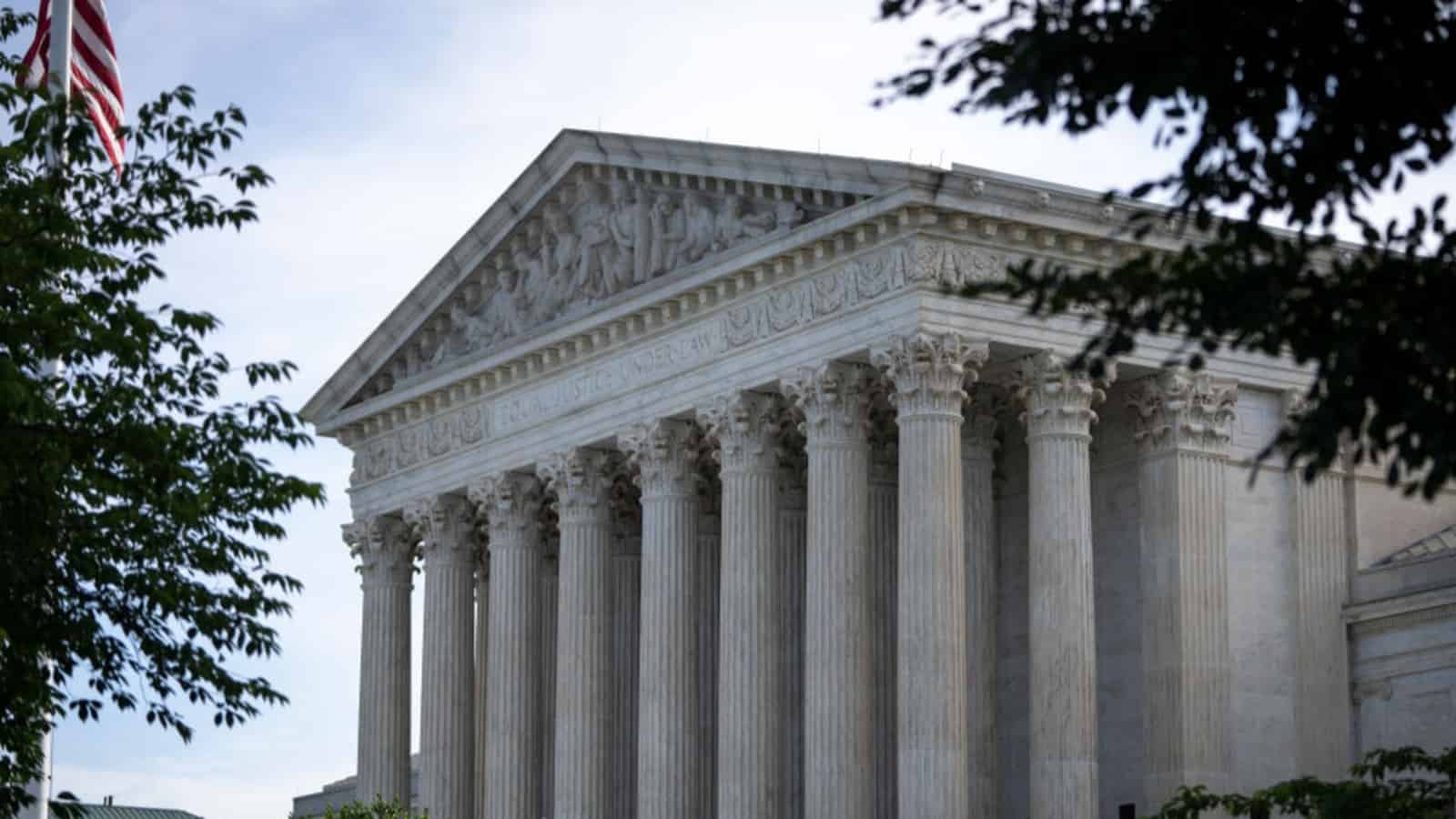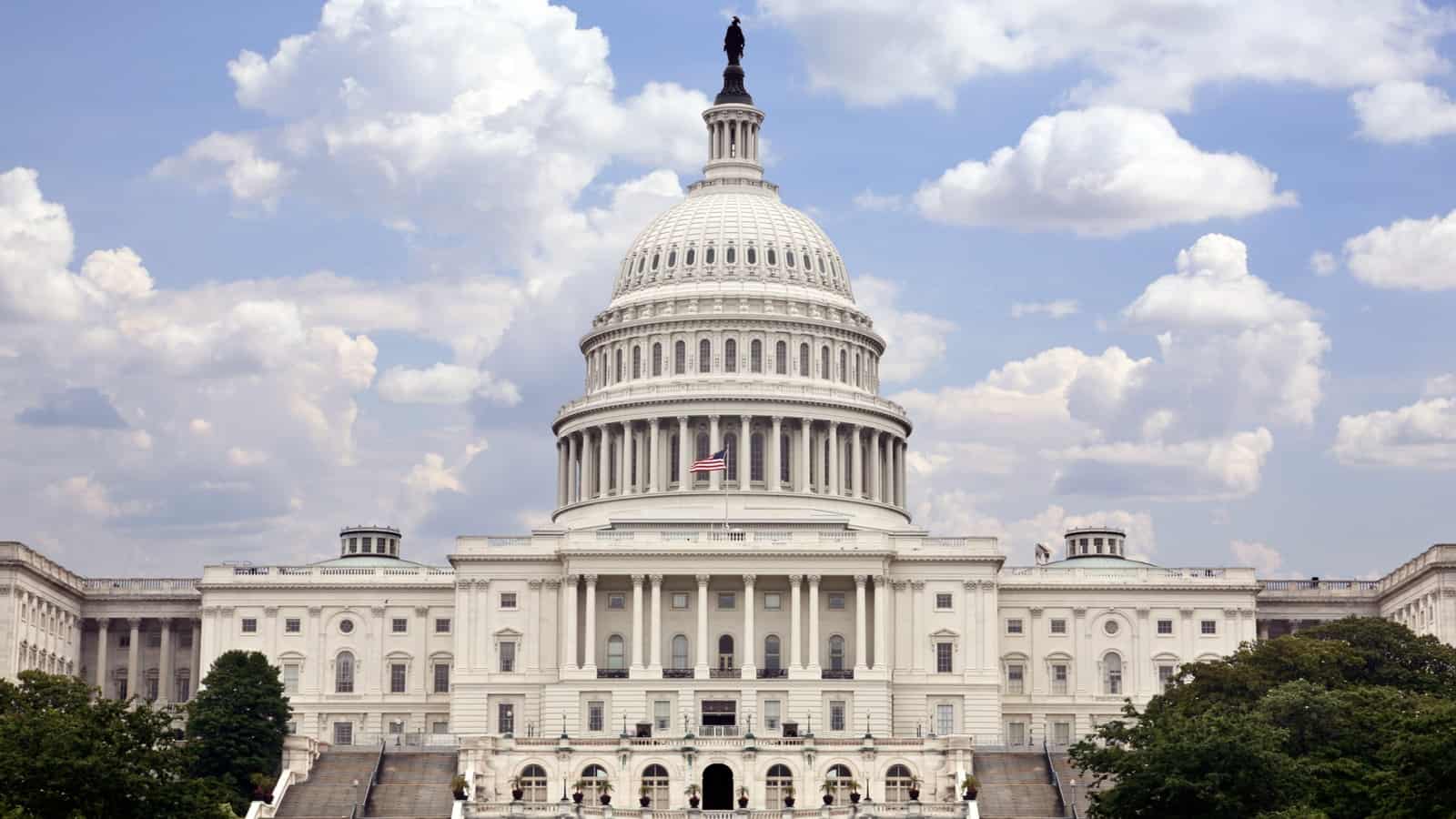Manufacturers: Court’s Decision Affirms EPA’s Authority to Issue Appropriate Greenhouse Gas Regulations
Washington, D.C. – Following the Supreme Court’s 6–3 decision in West Virginia vs. EPA, National Association of Manufacturers President and CEO Jay Timmons released the following statement:
“Manufacturers share a deep commitment to protecting our planet and our people, and manufacturing innovation holds the key to solving the generational challenge of climate change. The court’s decision affirms the Environmental Protection Agency’s authority to issue appropriate greenhouse gas regulations while providing a reminder that the agency must stay within the guardrails delegated by Congress. As some of the largest electricity consumers and as electricity generators, manufacturers are ready to work with the EPA to deliver innovative and balanced solutions that protect our environment and our competitiveness as it considers next steps.”
Background: Earlier this week, the NAM along with 42 state partners sent President Biden a letter highlighting the importance of affordable, reliable electricity for manufacturers to remain competitive. It signals manufacturers’ eagerness to work with policymakers on the important decisions and planning surrounding the future of the electrical grid and broader energy policy.
-NAM-
The National Association of Manufacturers is the largest manufacturing association in the United States, representing small and large manufacturers in every industrial sector and in all 50 states. Manufacturing employs more than 12.7 million men and women, contributes $2.71 trillion to the U.S. economy annually and accounts for 58% of private-sector research and development. The NAM is the powerful voice of the manufacturing community and the leading advocate for a policy agenda that helps manufacturers compete in the global economy and create jobs across the United States. For more information about the NAM or to follow us on Twitter and Facebook, please visit www.nam.org
New Unionization Changes Could Harm Manufacturers

An ongoing push for new unionization policies would be damaging for manufacturers and their workforces, and the NAM is leading the fight against them. NAM Director of Labor and Employment Policy Brian Walsh recently laid out what these efforts are and what they mean for the manufacturing industry.
The background: Recent unionization efforts at major corporations like Starbucks and Amazon have gained headlines across the US. But, according to Walsh, these movements are part of a much broader effort:
- “Where manufacturers should be really concerned…is the possible changes to union-organizing activity through legislation, such as the PRO Act, or through decisions from the National Labor Relations Board that will change current interpretations of labor law and enact card check nationwide,” said Walsh.
Card check: In case you aren’t familiar with it, card check is an alternative to the secret ballot elections that are required to occur with federal oversight.
- To begin the unionization process, card check efforts require over 50% of employees to sign a card indicating their interest in forming a union. Card check proposals also jeopardize employees’ right to privately cast their ballots and could lead to less secure union elections, according to Walsh.
- “The NLRB’s General Counsel, Jennifer Abruzzo, aims to overturn longstanding practices surrounding union elections and card check policies,” added Walsh. “She has also called for overruling prior standards that have given employers the right to speak to their employees on union organizing. This would be devastating for employers.”
PRO Act: “Manufacturers support workers’ federally protected right to collectively bargain, but the Protecting the Right to Organize Act would hurt relationships between employers and employees by allowing unions to access personal employee information in union-organizing drives,” said Walsh.
- “It is also another way to eliminate the secret ballot by taking away the ability for workers to privately cast their votes in a union election. This makes a worker’s vote known on a physical card for union organizers and their co-workers to see—making them susceptible to pressure campaigns.”
The NAM in action: The NAM is advocating against these policies and has been successful at holding back the PRO Act in the Senate.
- Most recently, the NAM has been leading a campaign to make sure that card check language is not included in Congress’ final China competition bill.
What’s ahead: “Because of the composition of the NLRB, we expect many cases to be decided against employers,” said Walsh. “This is where the work of the NAM Legal Center is going to be really important in our efforts to beat back union tactics. We will be engaged in NLRB proceedings—and are prepared to go to court when necessary.”
Get involved: To take action on this issue, go here.
The NAM Pushes for Effective and Efficient Broadband Funding

Last year’s bipartisan infrastructure bill, known as the Infrastructure Investment and Jobs Act, was a big victory for manufacturers—but now that the bill has been made law, the NAM is still working to make sure funding is distributed effectively and efficiently to the programs and projects that need it. That includes action on $48 billion in federal funding for expanded broadband access and broadband infrastructure, which will be primarily disbursed by the National Telecommunications and Information Administration at the U.S. Department of Commerce.
With the NTIA in the early stages of designating and developing broadband priorities, the NAM recently reached out to submit a set of principles that the process should follow to ensure effective funding allocation.
- Strong national standards: The NAM supports uniform requirements and industry performance standards across the entire United States. Divergent state and regional regulations can hamper the development of broadband access and interfere with the IIJA’s goal of increasing signal availability broadly. The significant funding provided in IIJA presents a valuable opportunity to develop nationwide service standards, which will encourage the growth of our national economic connectivity.
- Transparency: “The NTIA should remain committed to transparency in both program requirements and project allocations,” said NAM Director of Infrastructure, Innovation and Human Resources Policy Ben Siegrist. “ Manufacturers in America support broadband expansion not only for the needs of their local communities, but as an asset to improve American commercial competitiveness in a global business marketplace. Transparency in federal allocations, clarity of purpose and reliability of federal partners will ensure that competitive benefits are achieved on behalf of all enterprises in all regions.”
- Fair, timely and efficient rollout: The NAM encourages the NTIA to develop a framework for investing the IIJA funds through open competition, thoughtful evaluation and without delay. Further, the NTIA can ensure a concise and efficient rollout by avoiding overly complicated language or regulatory processes.
The last word: “Manufacturers in America understand the overwhelming value that expanded broadband access and infrastructure will provide for communities, consumers and commercial enterprises in all corners of the country,” said Siegrist. “From domestic economic competitive advantage to improved livelihoods and neighborhoods, the NTIA’s mission through IIJA directives can dramatically and positively impact the success of our national shared interests.”
Supreme Court Reviews Stay of Vaccine Mandate

The Supreme Court is reviewing state and business led efforts to block two of President Biden’s signature vaccine mandate policies according to The Washington Post.
The policies: “One measure requires large private companies to implement a requirement for employees to either be vaccinated for COVID-19 or mask and be tested weekly. The second applies to health-care workers at facilities that receive certain federal funding. Together, the cases test a signature aspect of the White House’s response to the pandemic that has killed more than 800,000 people in the United States.”
The challenges: All of the court action on the cases so far has revolved around whether the rules should be stayed while the courts review the legality of the rules. Lower courts have been divided over the policies. After the administration announced the rule for private companies, the U.S. Court of Appeals for the 5th Circuit blocked its enforcement. Shortly after that, A panel of the U.S. Court of Appeals for the 6th Circuit lifted the stay, and said the rules could go into effect. A similar split occurred around the healthcare mandate, with one court saying the rules could go forward and another court blocking them.
The Supreme issue: According to NAM Senior Vice President and General Counsel Linda Kelly, while the Supreme Court is considering only whether the policies should be stayed or allowed to go into effect while lower courts hear legal challenges to the provisions, the arguments covered several pivotal issues that go to the underlying merits of the challengers’ case. Throughout the two-hour oral argument, the Justices and advocates sparred over whether federal agencies (v. Congress or the States) have the authority to impose the mandates, whether the mandates are overbroad and should instead target only certain high-risk workplaces, the extent to which vaccines are “necessary” (i.e., whether other mitigation measures would adequately protect workers), and whether the pandemic constitutes an emergency allowing the government to bypass notice and comment rulemaking. We expect the Court to issue a decision within the next few days.
Get vaxxed: Getting vaccinated is still important in order to protect yourself and the people around you. Check out the This Is Our Shot – a collaboration between NAM and The Manufacturing Institute – for tools and information.
Manufacturers: SEC’s About-Face Is Deeply Troubling
Washington, D.C. – Following the announcement by the Securities and Exchange Commission that it intends to rescind commonsense investor protections designed to provide oversight of so-called proxy advisory firms—little-known, unregulated entities that exert enormous influence over publicly traded manufacturers—National Association of Manufacturers Senior Vice President of Policy and Government Relations Aric Newhouse released the following statement:
“The NAM is extremely concerned that the SEC has proposed substantial revisions to last year’s reasonable, light-touch proxy advisory firm rule—especially absent any new information about its impact on the market. Businesses and investors need reliable rules of the road, and the NAM is disappointed that the SEC plans to reverse course on a decade’s worth of bipartisan, consensus-driven policymaking just a year after the rule’s reforms were finalized. The SEC’s about-face is deeply troubling, but manufacturers continue to support appropriate oversight of proxy firms given their conflicts of interest, errors and outsized influence. The NAM looks forward to engaging with the SEC to defend the rule’s commonsense investor protections in the coming months.”
-NAM-
The National Association of Manufacturers is the largest manufacturing association in the United States, representing small and large manufacturers in every industrial sector and in all 50 states. Manufacturing employs more than 12.5 million men and women, contributes $2.52 trillion to the U.S. economy annually and has the largest economic multiplier of any major sector and accounts for 58% of private-sector research and development. The NAM is the powerful voice of the manufacturing community and the leading advocate for a policy agenda that helps manufacturers compete in the global economy and create jobs across the United States. For more information about the NAM or to follow us on Twitter and Facebook, please visit www.nam.org.
Manufacturers: Getting U.S. Methane Strategy Right Is Critical As We Tackle Climate Change
Washington, D.C. – Following the introduction of a proposed rule on methane regulation, the National Association of Manufacturers Vice President of Energy & Resources Policy Rachel Jones released the following statement.
“Getting the U.S. methane strategy right is critical as we tackle climate change, and manufacturers stand ready to work with the Biden administration and lawmakers on both sides of the aisle to address this pivotal issue in a way that doesn’t harm manufacturing in America.
“Manufacturers are working with the EPA to share their expertise, and many companies are leading the way in rolling out technologies that make it possible to lower both emissions and costs. We look forward to learning specific details of the administration’s full methane strategy as our sector continues to work to make our planet healthy for future generations.”
-NAM-
The National Association of Manufacturers is the largest manufacturing association in the United States, representing small and large manufacturers in every industrial sector and in all 50 states. Manufacturing employs more than 12.4 million men and women, contributes $2.52 trillion to the U.S. economy annually and has the largest economic multiplier of any major sector and accounts for 58% of private-sector research and development. The NAM is the powerful voice of the manufacturing community and the leading advocate for a policy agenda that helps manufacturers compete in the global economy and create jobs across the United States. For more information about the NAM or to follow us on Twitter and Facebook, please visit www.nam.org.
One Small Manufacturer Battles Thousands of Counterfeits

If you can buy anything online, how can you make sure that what you’re buying is genuine?
That’s a problem facing consumers and manufacturers alike. According to the NAM’s research, fake and counterfeit products cost the United States $131 billion and 325,000 jobs in 2019 alone—and estimates suggest that global trade in counterfeits exceeds $500 billion per year. The explosive rise of counterfeit goods has heavily impacted manufacturers, requiring them to fight back on a range of fronts.
For Clint Todd—the chief legal officer at Nite Ize, Inc., a manufacturer of mobile, pet and key accessories, as well as hardware, lighting and other products—that challenge is very real and only getting worse.
“In 2019, we took down 75,000 counterfeit listings and websites,” said Todd. “And we’re a small business, so you can guess how large the problem is countrywide.”
Why it’s happening: First, the online nature of e-commerce makes it more difficult to ensure accountability. Many counterfeit products are purchased through third-party sellers that may or may not provide real contact information.
- In practice, many platforms have not been held liable for counterfeit products sold on their platforms by these third-party sellers, even as they facilitate their sale. That means there’s often little manufacturers can do beyond asking the platforms to remove the listing.
- Second, a large proportion of the sellers of counterfeit goods are located in China and Hong Kong, making it much more challenging for U.S. companies to bring effective lawsuits, even if they do have accurate seller contact information.
“You have this odd confluence of laws and tech development and the involvement of another country that has driven this exponential increase in counterfeits,” said Todd. “You don’t have to be a rocket scientist to see how the inability to fight the problem has been detrimental to U.S. businesses.”
How manufacturers respond: Manufacturers and others have been forced into a piecemeal strategy that includes using software tracking services to find fraudulent trademarks and images; working with third-party sites to remove listings for knockoff merchandise; bringing lawsuits against counterfeiters where possible; and coordinating with the International Trade Commission. That strategy is challenging for lots of manufacturers but is particularly hard on small and medium-sized companies that may have fewer resources yet can be devastated when their products are ripped off.
What we need: The NAM’s report, “Countering Counterfeits,” details solutions for the federal government and the private sector, including:
- Requiring e-commerce platforms to reduce the availability of counterfeits;
- Modernizing enforcement laws and tactics to keep pace with counterfeiting technology;
- Streamlining government coordination;
- Improving private-sector collaboration; and
- Empowering consumers to avoid counterfeit goods.
As Todd put it, “It’ll take a multi-stakeholder approach. It’s not just the government. It’s not just manufacturers. It’s not just the online platforms. It has to be a coordinated approach with all those stakeholders to get to the heart of the matter.”
What the NAM is doing: The NAM is leading the effort against counterfeiting and has already made significant headway with policymakers. Among its recent highlights:
- After years of NAM advocacy, the Department of Homeland Security has implemented the Synthetics Trafficking and Overdose Prevention (STOP) Act of 2018, which steps up screenings for international mail shipments—one way in which counterfeits get into the U.S.
- In late 2020, Congress also implemented several NAM recommendations, including bolstering federal oversight at U.S. ports; cracking down on scammers and other bad actors exploiting the pandemic by producing fake goods or engaging in price gouging; and allowing the FDA to seize and destroy dangerous counterfeit medical devices.
- Both the Senate and House have seen the introduction of bipartisan bills that incorporate NAM recommendations on addressing the sale of counterfeits through online platforms.
The last word: “People need to understand the scope of the problem and how pervasive it has become,” said Todd. “Everyone needs to know how often counterfeits and knockoffs are affecting U.S. companies and how expensive and difficult it is to combat the problem with the tools we have at our disposal now.”
Manufacturers Fight SEC’s About-Face on Proxy Advisory Rule
Washington, D.C. – The National Association of Manufacturers filed a complaint in federal court against the Securities and Exchange Commission for its nonenforcement of the lawfully adopted 2020 final rule on proxy advisory firms—unregulated third parties with outsized influence on shareholder votes and manufacturers’ corporate governance policies.
“The SEC is changing course, attempting to suspend a commonsense rule that enhances transparency into the work of proxy advisory firms without any opportunity for public comment by the NAM or anyone else,” said NAM President and CEO Jay Timmons. “When the SEC finalized this reasonable, light-touch regulation, manufacturers strongly supported these necessary reforms because they protect the interests of manufacturing workers, retirees and everyday investors. The NAM Legal Center is filing suit to protect manufacturers from this unlawful about-face and to ensure that this rule stays on the books.”
Background:
The NAM has long advocated increased oversight of proxy advisory firms—little-known, unregulated entities that exert enormous influence over publicly traded manufacturers. These firms have significant conflicts of interest and issue error-filled, one-size-fits-all proxy voting recommendations that can impact the direction of a business and the value of investors’ shares. In July 2020, the SEC issued final regulations limiting proxy firms’ outsized influence, a move Timmons called a “long-sought, major win for the industry and millions of manufacturing workers.”
In October 2020, the NAM filed a motion to intervene in ISS v. SEC (ISS’s attempt to overturn the rule), followed by a motion for summary judgment outlining why the SEC’s lawful, reasonable and minimally invasive rule must be upheld. In June 2021, the SEC announced it was reviewing the rule and suspending enforcement thereof, at which point NAM Senior Vice President and General Counsel Linda Kelly made clear that the NAM would fight “any efforts to bypass the required notice-and-comment process to keep this lawfully issued rule on ice indefinitely.”
-NAM-
The National Association of Manufacturers is the largest manufacturing association in the United States, representing small and large manufacturers in every industrial sector and in all 50 states. Manufacturing employs more than 12.4 million men and women, contributes $2.52 trillion to the U.S. economy annually and has the largest economic multiplier of any major sector and accounts for 58% of private-sector research and development. The NAM is the powerful voice of the manufacturing community and the leading advocate for a policy agenda that helps manufacturers compete in the global economy and create jobs across the United States. For more information about the NAM or to follow us on Twitter and Facebook, please visit www.nam.org.
How Tax Reform Helped a Manufacturer Expand

INX International, a global manufacturer of high-performance printing inks and coatings, has a strong and growing presence in the U.S. thanks to tax reform.
The company’s success has been made possible in part by tax reform’s lower corporate tax rate and a foreign-derived intangible income (FDII) deduction, which encourages companies to develop and keep intellectual property in the U.S. by providing a lower tax rate for foreign sales based on U.S. IP. These reforms have helped manufacturers like INX invest in their U.S.-based facilities and employees—and INX has done exactly that.
Manufacturers wanted: From 2017 to today, the company has hired 89 people—a 7% increase in personnel. And even with the significant increase in workers, INX has been able to use its tax savings to pay good wages and benefits for all its employees.
- “We have not had one year since 2017 without raises or an increase in benefits,” said INX Vice President of Tax and Finance David Rossi. “That’s because the company has been doing pretty well—reaping the benefits from the economy and tax reform.”
Facilities expanded: INX has also worked to build new production capabilities, financed in part by the 2017 changes to the tax code.
- “The FDII deduction gave us $1.1 million in 2020 alone,” said Rossi. “That’s two-thirds of a solid equipment buildout for a new location. That number is significant to us.”
IP kept local: Provisions like the FDII deduction have made it possible for INX to keep their intellectual property in the United States, rather than moving critical production to facilities in other countries where labor and production costs might be lower.
- “We’re brick-and-mortar manufacturing in the U.S., and we keep our IP here; we keep our R&D here,” said Rossi. “Our ideas are here. Everything is developed here in the United States and kept in the United States.”
Continued benefits: The highly competitive labor market means that INX is also using its tax reform savings to attract and retain workers—making stability and certainty around these tax rules even more important.
- “We have dramatically increased starting wages, due to competition for manufacturing workers,” said INX CEO John Hrdlick. “Employees hired last year are also getting an increase. We’re offering incentives for referrals for new positions and spending a fair amount of money to recruit and keep people and stay ahead of our competition. If we weren’t in a strong position now, we wouldn’t be able to do that.”
The road ahead: The team at INX is concerned about what might happen if tax reform were to be rolled back and their tax burden were to increase. Especially with ongoing shortages of labor and materials—and with delays in shipping and freight transport—higher taxes would make it more difficult to continue the kinds of investments they have made.
- “Right now, any savings get invested into our people and our operations,” said INX Chief Financial Officer Bryce Kristo. “Any loss will negatively affect that.”
- “If there’s change, you’re talking about smaller facilities, less expansion or no expansion at all,” said Rossi.
The last word: “We are in a very competitive industry and an important industry,” said Hrdlick. “We’re almost a $500 million company, but given the high competitiveness, we are in single-digit operating income. All these proposed tax increases will pull some of that away. Everything we get, we invest in our people—and if that number is dramatically impacted, that’s going to be a problem for us.”
The NAM Looks Ahead

As Congress reconvenes this fall, the NAM will continue to make sure manufacturers’ priorities are front and center, driving the legislative conversation and shaping America’s future. We spoke with the NAM’s policy leaders to get a sense of the agenda going forward and discussed two bills in particular that are on manufacturers’ radar.
Bipartisan infrastructure reform: The $1.2 trillion investment would fund roads and bridges, as well as upgrades of the electric power grid and energy infrastructure, passenger and freight rail, public transit, airports, water systems, broadband and other critical priorities. Many of the bill’s investments were also initially highlighted in the NAM’s Building to Win framework—the NAM’s plan to invest in America’s infrastructure. The NAM will continue to work with Congress and President Biden to help move this bill across the finish line and ensure we can build the world-class infrastructure manufacturers deserve.
- “It’s critical that this moves forward,” said NAM Senior Vice President of Policy and Government Relations Aric Newhouse. “The bipartisan infrastructure reform bill would create transformative change—and every day that passes without it is a lost opportunity for manufacturers.”
- “We are using our influence to call on Congress to finalize this bill and move it to the president’s desk,” added NAM Vice President of Infrastructure, Innovation and Human Resources Policy Robyn Boerstling. “We also intend to stay engaged after it’s signed into law. This is a significant federal investment, with a lot of new programs and opportunities—and the NAM will be here to help steer our members through the implementation process.”
Reconciliation: Democrats are considering a multitrillion-dollar reconciliation bill that would supplement the bipartisan infrastructure reform bill with additional priorities in areas like health care, climate change and labor rules. As this bill moves ahead, the NAM is focused on preventing changes in corporate taxes, individual taxes, estate taxes and international tax policy that could harm manufacturers; blocking policies that could damage the employer–employee relationship; and standing up against efforts to stifle innovation in the pharmaceutical sector.
- Taxes: The bill proposes more than $2 trillion in tax increases that could hit every segment of the manufacturing economy. Proposed changes could affect big corporations through corporate taxes; globally engaged firms through changes to the Global Intangible Low-Taxed Income (GILTI) provision, the Base Erosion and Anti-Abuse Tax (BEAT) and a more limited incentive to locate intellectual property in the U.S.; family-owned businesses through estate tax reforms and increases to the capital gains rate; and small and medium manufacturers through changes to the tax system for pass-through entities. The bill would also make it harder to finance new equipment purchases through new limitations on the deductibility of interest on business loans.
- “These changes would affect every manufacturer, increasing the burden on corporations and pass-through entities,” said NAM Vice President of Tax and Domestic Economic Policy Chris Netram. “And we intend to stand up for our members, so that big and small manufacturers alike can compete, invest and grow here in the United States and around the world.”
- Pharmaceutical innovation: The reconciliation bill also contains provisions that would introduce price controls on certain medicines and harm the capacity to innovate by making it more difficult for pharmaceutical companies to invest in research and development, potentially hampering the creation of new medications and treatments. The NAM is fighting against these provisions to ensure that pharmaceutical companies are able to robustly invest in lifesaving cures.
- “Congress must take the long view on innovation,” said Newhouse. “If we take steps that harm pharmaceutical companies’ ability to innovate today, fewer lifesaving drugs will be available in the future. We think that’s a mistake.”
- Labor: In addition, the reconciliation bill in its current form seeks to impose some of the provisions of the Protecting the Right to Organize Act, or PRO Act. The bill, which previously passed the House in 2020, has the potential to reshape the relationship between employers and employees. The NAM will work to ensure these changes are not included.
- “The PRO Act is so broad and so sweeping in terms of its changes to the employee–employer environment that it comes at the expense of the manufacturing sector,” said Boerstling.
- “We’re going to do everything we can to keep this out of reconciliation because we believe the existing employee–employer relationship is working,” said Newhouse. “Now is not the time to blow it up with antiquated approaches to labor policy.”
The bottom line: This fall promises to be a busy time for policymakers in Washington, and the NAM intends to keep them focused on the needs and priorities of manufacturers across the country.
